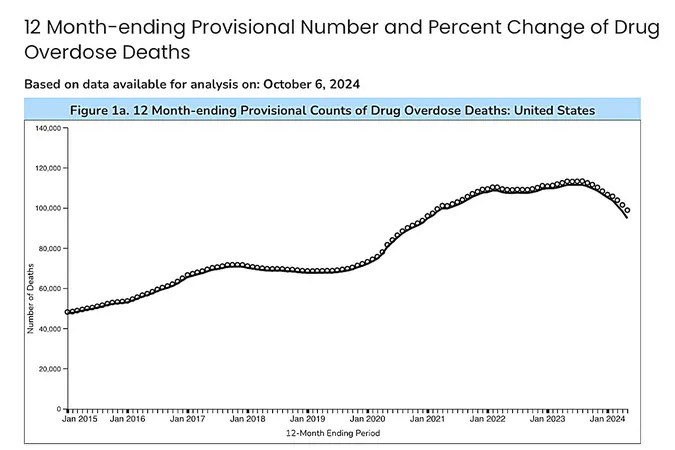
Is America Finally Turning the Tide on Drug Overdose Deaths? Experts Weigh In!
2024-10-28
Author: John Tan
Is America Finally Turning the Tide on Drug Overdose Deaths? Experts Weigh In!
In a groundbreaking announcement, the U.S. Centers for Disease Control and Prevention (CDC) revealed preliminary data indicating a staggering 12.7% drop in drug overdose deaths across the nation between May 2023 and May 2024. This significant decrease marks the largest decline in overdose fatalities since the onset of the opioid crisis, leading experts to cautiously celebrate this early sign of hope amidst a tragic epidemic.
Dr. Stephen Patrick, a prominent figure in public health and the chair of the Department of Health Policy and Management at Emory University's Rollins School of Public Health, suggests that although this data is promising, a careful interpretation is essential. "While the drop in overdose deaths is encouraging, we must be vigilant," Dr. Patrick stated.
The previous years have been marked by an alarming spike in drug-related fatalities, which peaked during the COVID-19 pandemic, with annual deaths surpassing 100,000. Experts are keen to remind us that while there have been minor fluctuations in overdose statistics in recent years, they rarely matched the scale of this recent decline.
So, what could be behind this remarkable downturn? Dr. Patrick highlights a significant shift in how we approach the overdose crisis, emphasizing increased availability and utilization of medication-assisted treatment (MAT) for opioid use disorder. These treatments have been shown to reduce mortality risk by an impressive 50%. There has also been a surge in harm reduction initiatives, including greater distribution of naloxone, an opioid overdose reversal drug, and fentanyl test strips aimed at preventing accidental overdoses from contaminated substances.
However, with good news often comes the need for cautious contemplation. Dr. Patrick warns against making definitive conclusions based solely on these figures. "We need to remember that this decrease may also reflect a diminishing number of high-risk individuals left susceptible to overdose," he explained. The lengthy battle against addiction has tragically left many individuals unreached while the crisis escalated, meaning that fewer individuals may be left to experience fatal overdoses now.
Moreover, these data do not present a complete picture. They overlook critical factors, such as the incidence of non-fatal overdoses and the ongoing struggles of treatment accessibility for many afflicted by substance use disorders. The ripple effects of the opioid epidemic run deep, reaching into foster care systems and long-term employment losses, yet these nuanced consequences remain unaddressed in broad statistical trends.
Even with the 12.7% decrease, Dr. Patrick points out that drug overdose deaths still remain unacceptably high in the U.S., with approximately 95,000 lives lost annually. To put this in perspective, that figure is nearly double the annual deaths caused by motor vehicle accidents and comparable to those lost to diabetes. "We must approach the opioid crisis with the same sense of urgency and policy focus that we apply to other health crises, like diabetes. While access to necessary medications for diabetes has improved, we must advocate for similarly supportive policies for treating substance use disorders,” he asserted.
The implications of this drop could ripple throughout American society, touching nearly every home. The opioid crisis has lingered for years, affecting families across the nation, and the potential for decreasing overdose fatalities offers a glimmer of hope for many who are currently impacted by addiction and its consequences.
As we digest this pivotal data, it becomes increasingly crucial to remain engaged and proactive in building resilience in our communities against substance use disorders. The road to recovery is long, and while there's light at the end of the tunnel, we should not forget to address the underlying issues that continue to pain countless families and communities. Will this be the turning point America desperately needs? Only time will tell.





 Brasil (PT)
Brasil (PT)
 Canada (EN)
Canada (EN)
 Chile (ES)
Chile (ES)
 España (ES)
España (ES)
 France (FR)
France (FR)
 Hong Kong (EN)
Hong Kong (EN)
 Italia (IT)
Italia (IT)
 日本 (JA)
日本 (JA)
 Magyarország (HU)
Magyarország (HU)
 Norge (NO)
Norge (NO)
 Polska (PL)
Polska (PL)
 Schweiz (DE)
Schweiz (DE)
 Singapore (EN)
Singapore (EN)
 Sverige (SV)
Sverige (SV)
 Suomi (FI)
Suomi (FI)
 Türkiye (TR)
Türkiye (TR)